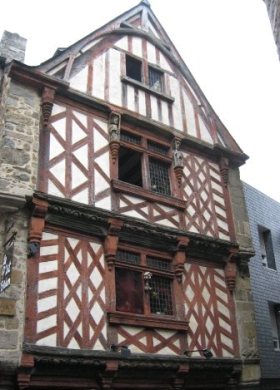In 1966, I was a stagiaire in the IU Honors Program in Foreign Languages. It goes without saying that the summer I spent in St. Brieuc changed the course of my life. One of the most moving moments for me was the afternoon in which Madame Monique Maury-Léon, the head French teacher for our 1966 group, recounted her experience in the French Resistance. She also invited one of the organizers of our stage, Doctor Erling Hansen, to relate his harrowing experience of being deported to Germany. Their stories have stayed with me over the years on both a conscious and unconscious level. Among other changes brought about by that afternoon in 1966, I became an avid reader of books written about the war years.
Last summer I returned to Saint-Brieuc to visit my “French family” (Monsieur and Madame Yves Jousse). Madame Jousse died several years ago but Monsieur Jousse and his daughter Claire Lagrais were there to greet me and to give me a copy of a book that Monsieur Jousse self-published in March of 2008. This book is what motivated me to write you after all these years. It concerns the years that he was forced to work in German factories under the terms of the STO (Service du travail obligatoire), as was the case for 600,000 French citizens. His book is a moving account of that experience.
I don’t know if the Honors Program in Foreign Languages is also aware that Madame Maury-Léon wrote a book describing her war experience. The book is entitled Sainte-Mère-Église libérée : l’Histoire racontée à ma petite-fille.
What’s more, Doctor Hansen, who is no longer alive, also self-published the journal he kept after he was deported by the Gestapo and forced to work as a doctor in German work camps. His book (there are only 15 copies) is titled Médecin du « kommando Martha » à Mülhausen (novembre 1943 — avril 1945 : Le « matricule no 42679 ». I was able to read it thanks to Monsieur Jousse and Claire Lagrais. After an exchange of letters concerning 620 jours à Berlin, they insisted on giving me their family copy of Doctor Hansen’s book and asked me to do what I could to see that his war experience lives on.
I recently donated my copies of 620 jours à Berlin and Médecin du « kommando Martha » à Mülhausen to the US Holocaust Memorial Museum in Washington, D.C. I donated them in the name of Monsieur Jousse. I obviously couldn’t keep them for myself.
I find it remarkable that three people closely involved with the 1966 stage all wrote books about their war experiences and I am immensely grateful to have come in contact with each of them. I so wish there was a way to honor them in the course of the Saint-Brieuc stage (via a ceremony or an article in the Saint-Brieuc newspaper or ...?). And what about the “French parents” of the other students in the 1966 stage? Did they also write about their war experiences?
Another way to honor Monsieur Jousse and Doctor Hansen would be to have the IU Press publish their books (45 pages for 620 jours à Berlin and 75 large-format pages for Médecin du « kommando Martha » à Mülhausen). As for Madame Léon-Maury, her book was not self-published and is available from a French-Canadian publishing company.
Or perhaps the IU Press could publish an anthology with excerpts taken from all three books as well as from other texts written by our Saint-Brieuc families concerning the war years.
I realize that the 2010 stage will be over soon (I saw on the website that the stage now lasts 6 weeks rather than 8 weeks, as was the case in 1966), but I decided to write you anyway. After mailing the books to the US Holocaust Museum, I quite simply felt compelled to contact you at once. The generation who went through the war in France is getting older and time is running out. Maybe you have already honored our Saint-Brieuc families in ways I’m not aware of, given that I’ve not kept in touch with the Honors Program over the years. At any rate, if I can be of help, please don’t hesitate to contact me.
And in case you were wondering, yes, the French language is still a vital part of my life. In fact, I’ve been living in Québec for the last ten years! Along the way, I completed a Certificat en création littéraire (a 30-credit program in Creative Writing in French), an M.A. in Littératures française et québécoise, volet création littéraire, and PhD coursework in French and Québécois literature, once again with a focus on création littéraire.
I send best wishes to all of you for the continued success of the Honors Program!


